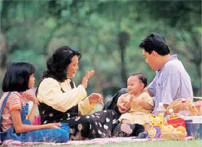The goals of parenting appear simple: ensure that your child grows healthily, help him achieve his full potential, build his confidence, and give him the right foundation to succeed in life. Achieving these goals, however, can be something of a challenge.
Indeed, parenting is like going on a long journey with your child, one that’s filled with twists and turns, joys and laughter, frustration and tears. But in spite of all these, the way ahead doesn’t have to be bumpy or mysterious.
A positive approach to parenting will enable you to anticipate and respond appropriately to your child’s changing physical, intellectual, emotional, social and nutritional needs. This begins with love and an understanding of the ages and stages of growth.
THE FIRST 12 MONTHS
Your baby is born and so begins the most exhausting stage of parenting – a 12-month blur of feeding, bathing, nappy changing and visiting the doctor for consultation and having your child vaccinated. All this keeps you on your toes. But watching your baby visibly grow and progress makes everything worthwhile.
AGES 1, 2, 3
Your child’s first birthday is the sign of more delights to come. A toddler now, he recognises you as his source of emotional security and comfort. He plays with you and responds with gestures, like holding up his arms to be picked up and cuddled.
At two, he is walking and running around. With eye-hand coordination improved, he plays with larger objects, like a favourite ball or toy. Increasing selfconfidence leads him to venture further away from you. He gladly plays alongside other children but not actually with them. Through his simple words and sentences, he begins to tell you what’s on his mind.
By three, your toddler is climbing, jumping and playing with smaller objects. He names colours and shapes, and speaks in multi-word sentences. Now playing with other children, he begins to learn how to share and handle his emotions.
Your toddler can be quite demanding during this stage. So, you need to strike a balance between giving in to him and teaching him to respect your parental authority. Resistance, defiance and tantrums are to be expected, showing all the more that he needs to learn limits and discipline.
FROM 4 TO 6
During this stage, your child’s growth rate is generally slow and steady, but he continues changing visibly. He gains a little height and weight, his limbs lengthen, his teeth keep developing, and he grows stronger, more agile and physically coordinated.
Having a larger vocabulary than before, he is now able to hold prolonged conversations and express his ideas. Listen and you will see the wonder of the world through his eyes.
Now attending kindergarten or pre-school, your child will learn so many things – from his ABCs, 1-2-3s, colours and songs… to the skills for getting along with other children. He learns not just from watching or listening to his teachers (and you, for that matter) but also from interacting with his peers.
As your child’s immune system is still developing, being and playing with his friends tends to increase his exposure to common infections, like the flu, colds, coughs, fever, diarrhoea and so on. Bouts of illnesses are a natural part of growing up; however, be sure to consult the doctor if they occur too frequently or develop into serious complications.
6 AND BEYOND
Primary school begins, bringing along the usual gamut of tuition, music lessons, sports and recreational activities. What other people think and do – particularly if they are your child’s teachers, friends or heroes – start to matter a little more than before.They can influence his interests, attitudes and behaviour. Even what and how he eats can be influenced in this way.
These are surprising years as your child becomes more independent with ideas and opinions of his own. But it would be unwise to leave him entirely to his own devices. He still needs help in distinguishing right from wrong, good from bad, and what’s proper. He also needs to know that you are interested in how he’s doing. Praise, encouragement, guidance and yes, discipline, are the signs of attention that he will recognise and love you for.
So, take part in his life and experience the joys of positive parenting.







Comments